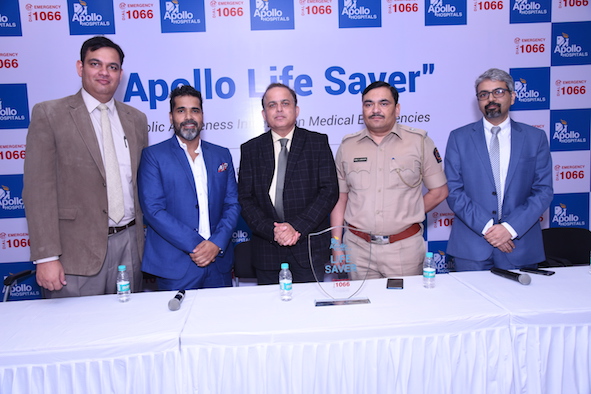Apollo Hospitals, Navi Mumbai today announced the launch of a yearlong public awareness programme called “Apollo Life Saver”. Apollo Life Saver will educate the public and create awareness about medical emergency services and offer basic life support training and first aid management in medical emergencies. Training will be provided to individuals especially in institutions such as housing societies, schools, colleges and corporate houses.
Patients often experience warning signs before an impending medical emergency and tend to either ignore it or put off medical intervention. However, if the condition worsens some can be left with a critical or life threatening condition. For early diagnosis & screening people can walk into the Apollo Emergency Department wherein the patient will be examined and assessed by the emergency physician and thereafter will be counselled/ advised regarding future course of treatment and action. The patient will not be levied any fee for the consultation by emergency physician. The initiative will focus on driving an understanding of the importance of early diagnosis of an ailment that may worsen if not tackled at the earliest.
Shri Sunil Lokhande, DCP Traffic, Navi Mumbai, said, “We are glad that the people of Navi Mumbai will be able to access timely emergency care if they meet with a medical emergency. An efficient emergency medical services team would save a lot of lives if the patients are diagnosed and treated immediately.”
Mr Santosh Marathe, COO & Unit Head, Apollo Hospitals said “Apollo Hospitals has been a pioneer in emergency medicine and we are proud to initiate the “Apollo Life Saver” programme. In last 3 years, we have had more treated over 40,000 patients in the ER department with excellent clinical outcomes. State-of-the-art infrastructure, latest emergency protocols & 24/7 accessibility to senior cardiologists, neurologists, surgeons and trauma specialists has been the key in providing optimal care for the patients. To encourage early diagnosis and screening, patients can get themselves assessed by the Emergency physician at ER department and they will not be levied any fee for the emergency consultation.”
Dr. Nitin Jagasia, Head, Emergency Medicine, Apollo Hospitals, said, “Golden hour management - correct assessment of the patient as well as the immediate treatment - is the key when it comes to life threatening emergencies like heart attacks, strokes, road traffic accidents etc. Along with this, recognizing the emergency as well delivering first aid & basic life support would complete the chain of survival to give our friends & family the best chance to beat a medical emergency. With the Apollo Lifesaver programme we aim to support this objective with no assessment charges for the Emergency Physician assessment and deliver training across the community in First Aid & Basic Life support.”
“Young individuals often ignore warning signs before any forthcoming medical emergency and do not seek medical attention. They are susceptible to heart ailments with the rising number of cardiovascular cases. Early detection in medical emergency cases can help save lives, provide superior clinical outcomes and improve the quality of life of the patients,” Dr. Rahul Gupta, Consultant, Cardiology added.
Dr. Sunil Kutty, Consultant, Neurosurgery, Apollo Hospitals said, “The programme is also intended for patients who have gone through severe trauma. Sometimes these conditions can get worse and leave them in critical condition, which cannot be fixed at a later stage. With the state-of-the-art infrastructure, every aspect of emergency services can be addressed. A case in point is the critical case of police sub-inspector Prashanth Desai earlier this year. He had met with an accident that caused brain tissue to jut out of his nose. Our team of doctors implanted a 3D printed skull with a titanium mesh. Mr Desai recovered successfully, but it wouldn’t have been possible if the advanced emergency systems & protocols were not in place.”
Addressing a real life case study, Quick Response Team (QRT) commando Swapnil Mandlik said, “Some patients are unable to reach a hospital on time. I am living example of emergency medical care provided by Apollo Hospitals when I had a serious spinal injury while saving a man attempting suicide this year in June. It is in addressing situations such as these that emergency systems and accessibility to specialists helps in saving lives. I’m thankful to the Doctors who for giving me a new lease of life.”

 Apollo Hospitals, Navi Mumbai today announced the launch of a yearlong public awareness programme called “Apollo Life Saverâ€. To encourage early diagnosis, patients will not be levied any fee for emergency medical consultation
Apollo Hospitals, Navi Mumbai today announced the launch of a yearlong public awareness programme called “Apollo Life Saverâ€. To encourage early diagnosis, patients will not be levied any fee for emergency medical consultation










.jpeg)







.jpeg)

.jpg)










